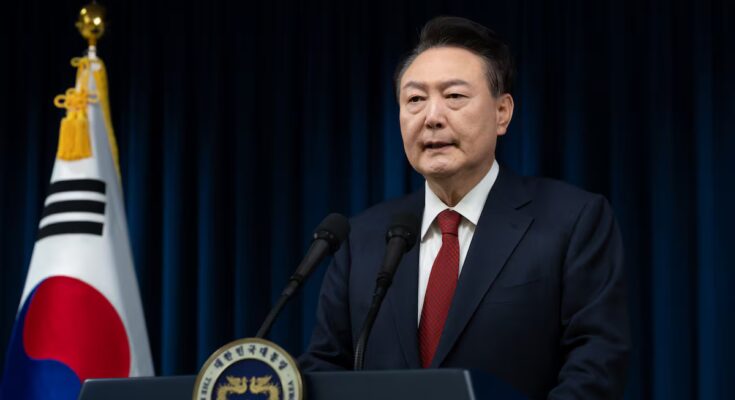The political crisis surrounding former South Korean President Yoon Suk-yeol took a new turn on Monday after the special prosecutor’s office handling his case filed new charges against him. The Prosecutor’s Office accuses him of abuse of power and of “favoring an enemy state”, following the alleged sending of drones to North Korea with the aim of stoking tension between the two neighbors in 2024. The charges are part of the judicial process opened by his imposition of martial law last December, an episode that shook the institutional foundations of the country and led to one of the biggest scandals in recent decades in the Asian democracy, a key ally of the United States in the region.
As reported this afternoon (early morning in Spanish peninsula time) by the spokesperson of the Prosecutor’s Office, Park Ji-young, the team led by the special prosecutor Cho Eun-suk claims that Yoon tried to provoke a military conflict between the two Koreas – officially still at war, after the signing of the armistice in 1953 – which would serve as a pretext to declare the emergency regime.
“(Yoon) and others conspired to create conditions that would allow emergency martial law to be proclaimed, thereby increasing the risk of armed confrontation and harming the state’s military interests,” Park said at a news conference, South Korea’s Yonhap news agency reported.
Park explained that the accusation is based on a memorandum written in October 2024 by the then counterintelligence chief in which he urged “to create an unstable situation or take advantage of an opportunity that presents itself” to increase tension and support the decision to declare the extreme measure. According to the spokesman for the Prosecutor’s Office, the document indicates that the army should target key locations for Pyongyang “so that the response is inevitable.”
Investigators also filed charges against three senior military officers involved in the case: former Defense Minister Kim Yong-hyun, former head of the Defense Counterintelligence Command, Yeo In-hyun, and head of the Drone Operations Command, Kim Yong-dae. The first two are accused of collaboration with the enemy and abuse of power, while the third is accused of minor crimes, namely obstruction of official functions and requesting the preparation of false documentation to cover up the operation.
In October last year, Pyongyang reported that Seoul had sent drones to the North Korean capital to drop leaflets against Kim Jong-un’s government and had published photographs of the remains of a crashed South Korean military drone. The South Korean military then declined to comment on the alleged operation, a dynamic that continued into Monday. According to Yonhap, the Ministry of Defense said it would not comment while the judicial process continues.
Although prosecutors initially considered charging Yoon with “inciting foreign aggression” – a crime requiring evidence of conspiracy – they ultimately settled on the charge of “aiding the enemy,” concluding that sending drones led to the leak of military secrets.
Yoon, 64, was removed as head of state by the Constitutional Court in April, opening the door for justice to move forward investigating other criminal charges related to the events of December 3, 2024. Yoon has since been formally charged with leading an insurrection and is in pre-trial detention while the criminal trial in this case continues. If convicted, the former leader could spend the rest of his life behind bars or even be sentenced to capital punishment, although there has been a moratorium on this subject since 1997.
The Special Prosecutor’s Office led by Cho is an autonomous body within the judicial system created in the summer and has extraordinary powers to issue court orders, carry out searches, interrogate suspects and request arrest warrants against senior officials if it deems it necessary. He had previously accused Yoon of obstructing his detention and ignoring legal procedures and his own Cabinet’s consent to proclaim a state of emergency.
Yoon has claimed in recent months that he does not want to establish a military regime, but rather tries to “alert about irregularities committed by the opposition” (whom he accused of sympathizing with North Korea) and to “protect democracy from anti-state activities”.


